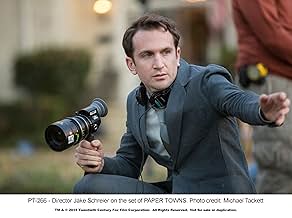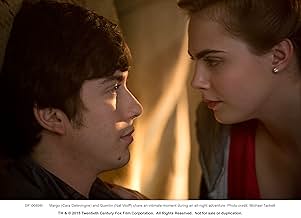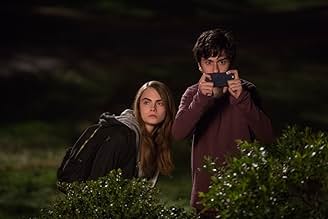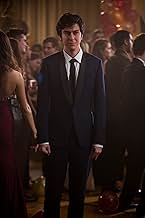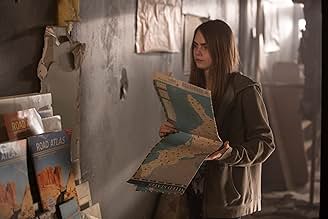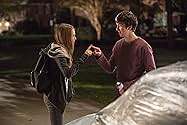VALUTAZIONE IMDb
6,2/10
110.570
LA TUA VALUTAZIONE
Dopo un'avventura che dura tutta la notte, la cotta di tutta la vita di Quentin, Margo, scompare, lasciando dietro di sé indizi che Quentin e i suoi amici seguono.Dopo un'avventura che dura tutta la notte, la cotta di tutta la vita di Quentin, Margo, scompare, lasciando dietro di sé indizi che Quentin e i suoi amici seguono.Dopo un'avventura che dura tutta la notte, la cotta di tutta la vita di Quentin, Margo, scompare, lasciando dietro di sé indizi che Quentin e i suoi amici seguono.
- Regia
- Sceneggiatura
- Star
- Premi
- 4 vittorie e 3 candidature totali
Hannah Riley
- Young Margo
- (as Hannah Alligood)
Recensioni in evidenza
Reviewed by: Dare Devil Kid (DDK)
Rating: 3.4/5 stars
"Paper Towns" isn't as deep or moving as it wants to be, yet it's still earnest, well-acted, and thoughtful enough to earn a place in the hearts of teen filmgoers of all ages while providing a breezy, light-hearted nostalgic trip for adult viewers. Unlike "The Fault in Our Stars" (the first, big-screen John Green adaptation), the overall mood here is safe rather than edgy, but what it does do very effectively is capture a particular quality of adolescent yearning.
"Paper Towns" follows the familiar story of the wannabe high- schooler who meets a dreamy girl and everything falls into place. Trying to subvert this stereotypical storyline, the film neatly weaves themes of loneliness, fear, depression, and anxiety into the plot. The film takes a lot of the original spirit of the novel while subverting the story, taking out all the meandering teenage angst and replacing it with a fun, understated film.
It's eventually a bittersweet teen film with much to offer even those of us who have, in theory, grown up, although it never quite reaches its potential of a remarkable coming-of-age drama.
Rating: 3.4/5 stars
"Paper Towns" isn't as deep or moving as it wants to be, yet it's still earnest, well-acted, and thoughtful enough to earn a place in the hearts of teen filmgoers of all ages while providing a breezy, light-hearted nostalgic trip for adult viewers. Unlike "The Fault in Our Stars" (the first, big-screen John Green adaptation), the overall mood here is safe rather than edgy, but what it does do very effectively is capture a particular quality of adolescent yearning.
"Paper Towns" follows the familiar story of the wannabe high- schooler who meets a dreamy girl and everything falls into place. Trying to subvert this stereotypical storyline, the film neatly weaves themes of loneliness, fear, depression, and anxiety into the plot. The film takes a lot of the original spirit of the novel while subverting the story, taking out all the meandering teenage angst and replacing it with a fun, understated film.
It's eventually a bittersweet teen film with much to offer even those of us who have, in theory, grown up, although it never quite reaches its potential of a remarkable coming-of-age drama.
Quentin Jacobsen is an Orlando high school senior with a small comfort zone. He's a band geek with his best friends Ben and Radar. Margo has been living across the street for 11 years. They were friends when she first arrived. They found a dead body but he refused to follow her adventures and they drifted apart. Now suddenly, she climbs into his window. She pulls him into a night of revenge against her cheating boyfriend and her backstabbing friends. She's gone the next day but she has left clues for Quentin to find her paper town. Quentin, Ben, Radar, Radar's girlfriend Angela, and Margo's friend Lacey go on a road trip.
Cara Delevingne shows competent acting and a good intriguing presence which is necessary for the role. The movie starts with her taking our lead on a nice adventure. It has its moments. I like those one-night adventures in movies. Then there is the mystery which is less compelling because I'm mostly waiting for the inevitable road trip. I also like a good road trip and this one has its moments, too. The movie ends with a nice 'lesson'. Everything is fair but nothing is outstanding. The three guys are nice but lacks great charisma. They are more and less regular teens which has its appeal. I like their friendship. As a book, I'm sure this has many fans. As a movie, it needs more adventures and more cinematic excitement. It could have tightened the middle and added more to the road trip when the group is together. This is fine but it could have been much better.
Cara Delevingne shows competent acting and a good intriguing presence which is necessary for the role. The movie starts with her taking our lead on a nice adventure. It has its moments. I like those one-night adventures in movies. Then there is the mystery which is less compelling because I'm mostly waiting for the inevitable road trip. I also like a good road trip and this one has its moments, too. The movie ends with a nice 'lesson'. Everything is fair but nothing is outstanding. The three guys are nice but lacks great charisma. They are more and less regular teens which has its appeal. I like their friendship. As a book, I'm sure this has many fans. As a movie, it needs more adventures and more cinematic excitement. It could have tightened the middle and added more to the road trip when the group is together. This is fine but it could have been much better.
Coming on the heels of its commercially-successful predecessor, 'The Fault in Our Stars', PAPER TOWNS is no heavy tearjerker, but it echoes more affectionate and piercing sentiments, with its lighter, minimalist take of its recognizable subjects.
The film follows Quentin (Nat Wolff) , or "Q" as he is more popularly called, a highschool boy who has been nursing an unrequited love for the girl living next door, Margo (Cara Delevigne) since childhood. Even after when they turn 12, when Margo suddenly becomes distant, "Q" never loses the affection, and it only becomes even stronger when one day she climbs again to his window, the way she did when they were still kids. The next events follow an eager "Q" savoring the moment as he escorts Margo in her series of "small revenge" against those she thinks have betrayed her, including her ex-boyfriend. But the levitating moment would only last overnight, because the next day, the ever mystifying Margo, disappears.
Mining on the same overly familiar material that dwells on both coming-of-age and teenage romance territories, PAPER TOWNS pulls off two easily-recognizable efforts: maintaining 'The Fault's charm, while toning down its tragic notions. The latter of which, yields a more tangible and heartwarming result, capable of conjuring a lasting tug at the heartstrings. The credit for this goes to its equally-charming yet capable actors, both of whom teeming with fresh and enigmatic likability. It will also sound unforgivable to never pay regard to the film's brilliant screenwriters who manage to cleverly highlight this extremely familiar highschool tale's stronger and more relatable sentiments, genuinely and sincerely enough, to bend fragile emotions with crippling capacity.
"Q"'s road trip in finding Margo represents a bigger journey with far wider scope and meaning, and it comes across as a process of personal exploration that unknowingly liberates one self, toward finding the deeper sense of their existence. Hardly that the questions thrown get resolved, but the charming and sincere take of its proceedings, will ultimately make the narrative arrive to a satisfying conclusion. This doesn't mean it's able to satisfy its own queries, but the resolution delivered are nonetheless, reliable and honest.
PAPER TOWNS will come across as a witty, yet touching case of a 'lost and found'. Much of it is spent in searching for the 'lost', a liberating process that frees its seekers from every question that unfolds in the wake of a previous other, but the 'found', though never really answers any of the previous questions, will deliver a surprisingly satisfying, and never less of a rewarding, answer.
The film follows Quentin (Nat Wolff) , or "Q" as he is more popularly called, a highschool boy who has been nursing an unrequited love for the girl living next door, Margo (Cara Delevigne) since childhood. Even after when they turn 12, when Margo suddenly becomes distant, "Q" never loses the affection, and it only becomes even stronger when one day she climbs again to his window, the way she did when they were still kids. The next events follow an eager "Q" savoring the moment as he escorts Margo in her series of "small revenge" against those she thinks have betrayed her, including her ex-boyfriend. But the levitating moment would only last overnight, because the next day, the ever mystifying Margo, disappears.
Mining on the same overly familiar material that dwells on both coming-of-age and teenage romance territories, PAPER TOWNS pulls off two easily-recognizable efforts: maintaining 'The Fault's charm, while toning down its tragic notions. The latter of which, yields a more tangible and heartwarming result, capable of conjuring a lasting tug at the heartstrings. The credit for this goes to its equally-charming yet capable actors, both of whom teeming with fresh and enigmatic likability. It will also sound unforgivable to never pay regard to the film's brilliant screenwriters who manage to cleverly highlight this extremely familiar highschool tale's stronger and more relatable sentiments, genuinely and sincerely enough, to bend fragile emotions with crippling capacity.
"Q"'s road trip in finding Margo represents a bigger journey with far wider scope and meaning, and it comes across as a process of personal exploration that unknowingly liberates one self, toward finding the deeper sense of their existence. Hardly that the questions thrown get resolved, but the charming and sincere take of its proceedings, will ultimately make the narrative arrive to a satisfying conclusion. This doesn't mean it's able to satisfy its own queries, but the resolution delivered are nonetheless, reliable and honest.
PAPER TOWNS will come across as a witty, yet touching case of a 'lost and found'. Much of it is spent in searching for the 'lost', a liberating process that frees its seekers from every question that unfolds in the wake of a previous other, but the 'found', though never really answers any of the previous questions, will deliver a surprisingly satisfying, and never less of a rewarding, answer.
Maybe I'm getting old. These over-serious, platitude-filled teen dramas used to only mildly annoy me. Now, with Paper Towns, I feel myself getting irrationally angry at its desperate plea to be this generation's The Breakfast Club. From where is that resentment coming? Maybe it's that I'm a 30-year-old married-father who's not meant to like this movie. Maybe it's that I'm coming off the high of the teen drama Me and Earl and the Dying Girl. Whatever it is, Paper Towns irritated much more than it charmed. The premise has potential: nerd spends one magically frivolous night with the enigmatic girl of his dreams, Margot, before she inexplicably disappears. Instead of being unique, stylish, or progressive, it becomes the lament of the rich-white-teen and the manic pixie dream girl. Our "hero" is drawn to her magnetic mystery, but that appeal never reaches the audience. At times, she represents an idea more than a character, but mostly she's an unbearably selfish, manipulative shrew, using her womanly wiles to get whatever she needs. When she's off-screen, the interplay between the friends is watchable, but her bothersome presence is never far away. Worst yet, in the end PT never takes a stance on Margot, like the movie is trying to have its cake and eat it too. Stylistically, the movie is forcefully quirky, annoyingly cutesy, and boasts a soundtrack that's like someone pushed the "hipster" button on a Casio Keyboard. We can only blame director Schreier, whose previous film was the under-seen Robot and Frank. Just stay home and watch that, a story about a machine with more humanity than anyone in PT.
When reviewing a movie based on a book, should the reviewer make the movie's story part of the commentary, even if the movie's plot matches the book's plot closely? I say yes. And I'll go even further. I don't think it's necessary for the reviewer to read the book before reviewing the movie. Here's why: A movie reviewer reviews movies, not books. A movie has to stand on its own, whether the viewer has read the book or not (and, usually, the majority haven't). Now, if I haven't read the book, after I see the movie, I'll do some background research on the differences between the two so I can include that information in my review, but I'm still only going to judge aspects of the movie as they contribute to the whole. Take the movie "Paper Towns" (PG-13, 1:49) for example. Although I haven't read the book, I have read enough about the book to compare them, but I'm still only judging what appeared on screen.
I say all that to say this: "Live life to the fullest." There. I just saved you almost two hours. That's really all this movie is about. Didn't care for the story. Didn't care for the movie. Still, I do owe you more than that, so, as always, I'll tell you about the actors and the plot (without spoilers), I'll explain the grade I've given the movie, including what I think wasn't good and what was good (because, after all, there's some of both in almost every movie). And whether you think the book was better than the movie or the movie was better than the book is irrelevant. This is a movie review. Ya feel me? Cool. Onward and upward The movie takes its title from the 2008 book by John Green (author of "The Fault in Our Stars"). In the eyes of one of the story's central characters, paper towns are cities in which people ("paper people") go about their hum-drum lives without really living. The title also carries a literal real-world meaning. The title is a reference to the cartographers' practice of putting fake places onto the maps they make to deter copyright infringement (or catch anyone who does such infringing). These plagiarism traps have several names, including paper towns. One such paper town is Agloe (in New York State's Catskill Mountains), which is where the story's climax takes place. But the story begins in Orlando, Florida.
Quentin "Q" Jacobsen (Nat Wolff) fell in love with Margo Roth Spiegelman (model-singer-actress Cara Delevingne) when her family moved in across the street from his. Both kids were in elementary school, but it was love at first sight for him. It was friendship for her and then it wasn't even that. Q and Margo drifted apart. As high school seniors, they don't even acknowledge each other anymore. She's beautiful, free-spirited and mysterious (as she has always been) and hangs out with the other popular kids. Q is socially awkward and the opposite of adventurous and hangs out with his two best friends and fellow band students, Ben Starling (Austin Abrams) and Marcus "Radar" Lincoln (Justice Smith).
The action really starts one night when Margo crawls in through Q's bedroom window and asks to borrow his car to pull revenge pranks on her cheating boyfriend and others whom she feels have betrayed her. Q reluctantly agrees to be her getaway driver, and even helps a bit. Over the course of the night, he admits that he had fun and he begins to hope that this experience will rekindle his dormant friendship with Margo and maybe lead to something more. His hopes are soon dashed when Margo goes missing. Her parents believe that she has run away (for the fifth time), and now that she's 18, they aren't even going to look for her. Both Q and Lacey Pemberton (Halston Sage), Margo's best friend, want to know what happened to Margo, but they haven't a clue yet.
"Margo always loved mysteries," Q tells us in his brief narration at the beginning of the film. "So much that she became one." Margo may be a gone girl, but she left clues, which lead Q, Ben and Radar to search Margo's room, take her bedroom door off its hinges, go to an abandoned building in a shady part of town and, eventually take a long road trip, joined by Radar's girlfriend, Angela (Jaz Sinclair) and Lacey, on whom Ben has a crush (when he's not lusting after Q's mother). Through all this, the film omits some of the episodes in the book (as almost all film adaptations have to do), but keeps all the most important plot points (including the ending), as well as the "moral of the story".
"Paper Towns" has a worthwhile message, but takes as long to get there as driving from Florida to New York. The story's original enough, but it's highly unrealistic. The actors are appealing and the film treats the teens like real people, but they seem abnormally worldly for their ages and their angst sometimes annoyingly plays out as nothing more than (mostly) spoiled rich white kids complaining about their lives. Lastly, after emotionally investing (as much I could) in these characters, as well as almost two hours of my time, I found the ending frustrating. "Paper Towns" is as disappointing as a sightseeing trip to Agloe, New York. "C"
I say all that to say this: "Live life to the fullest." There. I just saved you almost two hours. That's really all this movie is about. Didn't care for the story. Didn't care for the movie. Still, I do owe you more than that, so, as always, I'll tell you about the actors and the plot (without spoilers), I'll explain the grade I've given the movie, including what I think wasn't good and what was good (because, after all, there's some of both in almost every movie). And whether you think the book was better than the movie or the movie was better than the book is irrelevant. This is a movie review. Ya feel me? Cool. Onward and upward The movie takes its title from the 2008 book by John Green (author of "The Fault in Our Stars"). In the eyes of one of the story's central characters, paper towns are cities in which people ("paper people") go about their hum-drum lives without really living. The title also carries a literal real-world meaning. The title is a reference to the cartographers' practice of putting fake places onto the maps they make to deter copyright infringement (or catch anyone who does such infringing). These plagiarism traps have several names, including paper towns. One such paper town is Agloe (in New York State's Catskill Mountains), which is where the story's climax takes place. But the story begins in Orlando, Florida.
Quentin "Q" Jacobsen (Nat Wolff) fell in love with Margo Roth Spiegelman (model-singer-actress Cara Delevingne) when her family moved in across the street from his. Both kids were in elementary school, but it was love at first sight for him. It was friendship for her and then it wasn't even that. Q and Margo drifted apart. As high school seniors, they don't even acknowledge each other anymore. She's beautiful, free-spirited and mysterious (as she has always been) and hangs out with the other popular kids. Q is socially awkward and the opposite of adventurous and hangs out with his two best friends and fellow band students, Ben Starling (Austin Abrams) and Marcus "Radar" Lincoln (Justice Smith).
The action really starts one night when Margo crawls in through Q's bedroom window and asks to borrow his car to pull revenge pranks on her cheating boyfriend and others whom she feels have betrayed her. Q reluctantly agrees to be her getaway driver, and even helps a bit. Over the course of the night, he admits that he had fun and he begins to hope that this experience will rekindle his dormant friendship with Margo and maybe lead to something more. His hopes are soon dashed when Margo goes missing. Her parents believe that she has run away (for the fifth time), and now that she's 18, they aren't even going to look for her. Both Q and Lacey Pemberton (Halston Sage), Margo's best friend, want to know what happened to Margo, but they haven't a clue yet.
"Margo always loved mysteries," Q tells us in his brief narration at the beginning of the film. "So much that she became one." Margo may be a gone girl, but she left clues, which lead Q, Ben and Radar to search Margo's room, take her bedroom door off its hinges, go to an abandoned building in a shady part of town and, eventually take a long road trip, joined by Radar's girlfriend, Angela (Jaz Sinclair) and Lacey, on whom Ben has a crush (when he's not lusting after Q's mother). Through all this, the film omits some of the episodes in the book (as almost all film adaptations have to do), but keeps all the most important plot points (including the ending), as well as the "moral of the story".
"Paper Towns" has a worthwhile message, but takes as long to get there as driving from Florida to New York. The story's original enough, but it's highly unrealistic. The actors are appealing and the film treats the teens like real people, but they seem abnormally worldly for their ages and their angst sometimes annoyingly plays out as nothing more than (mostly) spoiled rich white kids complaining about their lives. Lastly, after emotionally investing (as much I could) in these characters, as well as almost two hours of my time, I found the ending frustrating. "Paper Towns" is as disappointing as a sightseeing trip to Agloe, New York. "C"
Lo sapevi?
- QuizJohn Green: The author, as the voice of the shotgun-wielding father of Becca.
- BlooperWhen Quentin enters the washroom at the party, the shower curtains are already open, but then later on you see Lacey opening the shower curtains.
- Citazioni
Quentin Jacobsen: What a treacherous thing to believe that a person is more than a person.
I più visti
Accedi per valutare e creare un elenco di titoli salvati per ottenere consigli personalizzati
- How long is Paper Towns?Powered by Alexa
Dettagli
Botteghino
- Budget
- 12.000.000 USD (previsto)
- Lordo Stati Uniti e Canada
- 32.000.304 USD
- Fine settimana di apertura Stati Uniti e Canada
- 12.650.140 USD
- 26 lug 2015
- Lordo in tutto il mondo
- 85.512.300 USD
- Tempo di esecuzione
- 1h 49min(109 min)
- Colore
- Mix di suoni
- Proporzioni
- 2.35 : 1
Contribuisci a questa pagina
Suggerisci una modifica o aggiungi i contenuti mancanti







